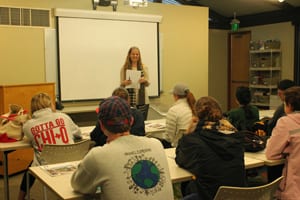Tapping students’ rich algebraic ways of reasoning during out-of-school activities — such as sports, social networking and video games — generates personalized connections
Can students learn algebra from Instagram and video games?
Teaching researcher Candace Walkington, Southern Methodist University, Dallas, thinks so.
Walkington’s new study, funded by the National Academy of Education, will test that idea.
“In previous work, I found that students draw upon rich algebraic ways of reasoning when pursuing their out-of-school interests in areas like sports, social networking and video games,” said Walkington, whose research focus is evidence-based effective teaching. “Making connections to these topics in algebra class can improve long-term understanding of algebraic ideas.”
The new study asks pre-algebra students to author their own algebra stories based on their personal interests.

Students in middle schools in Dallas Independent School District will describe how linear relationships approximate what they encounter in their everyday lives, such as how they accumulate followers on Instagram or score points in a video game over time, said Walkington, an assistant professor of teaching and learning.
Approximately 200 pre-Algebra students in eight classrooms at schools in the Dallas Independent School District are participating in the study. Based on results from earlier research, Walkington hypothesizes that authoring the stories will elicit students’ interest in the content to be learned by drawing on their knowledge about home and community.
A pilot version of the study begins Spring 2015. The full study starts Fall 2015.
Walkington was awarded the grant as part of the Spencer Postdoctoral Fellowship Program of the National Academy of Education. The $55,000 grant supports early career scholars working in critical areas of education research.
Making math accessible and captivating is critical for encouraging learning
Algebra is a gatekeeper to many careers and to higher-level mathematics, making it critical for students to master, Walkington said, but students struggle to understand the abstract representations.
“Students often can’t see the connection between their world and algebra,” she said. “Exploring ways to connect math to their lives, experiences and knowledge is critical for making it accessible and captivating. That’s especially true when considering students from diverse backgrounds.”
Walkington’s previous studies — including participation in the Measures of Effective Teaching Project, funded by the Bill & Melinda Gates Foundation, and her long-time collaboration with Carnegie Mellon University’s Pittsburgh Science of Learning Center — have focused on how abstract mathematical concepts can be grounded in students’ out-of-school interests, experiences and everyday reasoning practices.
“These studies combine cognitive theories related to activation of prior knowledge with motivational theories related to the development of interest in order to understand and intervene upon students’ mathematical understanding,” Walkington said.
Search for effective teaching drives quantitative, qualitative methods
Walkington’s study uses qualitative and quantitative methods to compare an experimental group to a control group. She will look at how the intervention elicits students’ interest in learning algebra, and at the impact on students’ classroom discussions, on learning algebra concepts and promoting a positive outlook toward math.
“Personalizing instruction has the potential to improve learning and attitudes in algebra courses that are a key barrier to academic advancement and economic attainment,” said Walkington, a professor in SMU’s Annette Caldwell Simmons School of Education & Human Development.
Walkington’s NAE study at Marsh Middle School in Dallas will provide personalized learning interventions for seventh and eighth grade math students. The study complements a new grant recently awarded to Dallas Independent School District by the Gates Foundation to build personalized learning models in eight DISD schools. Walkington will provide professional development to the eight teams, and is planning a research study that describes the process all eight schools go through as they build personalized learning models on their campuses.
The research is critical for establishing evidence-based criteria for teaching.
“There actually hasn’t been an extensive body of research showing if the customized approach is effective, for whom it’s effective, or what content it’s effective for. So there’s a lack of evidence,” says Walkington. “At the same time, we have this rise of technological systems in the schools with amazing potential to individualize instruction to each student.”
New design studies build and expand on previous findings
One of Walkington’s recent studies, published in the Journal of Educational Psychology, draws data from Pennsylvania classrooms using an in-school intelligent tutoring system for Algebra I. The software personalizes instruction to match the pace of each student, detects a student’s current state of knowledge, determines which kinds of problems to present and what feedback and help are needed, and tracks each child’s progress.
Walkington took that a step further by adding student interests and hobbies into the software. After surveying ninth grade students about their interests, Walkington wrote math problems around those interests. The problems were programmed into the software, so problems are presented in the context most appealing to each individual student.
“We found that students receiving personalization performed better on the math lesson than students presented problems that weren’t customized to their interests. We also found that one or two months later – on future lessons that weren’t personalized – those students who had received personalization were still doing better,” Walkington said.
That study has been expanded to another group of high school students. In a recent paper presented at the Educational Data Mining Conference in London, Walkington demonstrated that personalization improved students’ interest in mathematics, which in turn improved achievement for those not interested in math initially. Ongoing studies in Houston and San Antonio schools allow students the choice of personalized context for each problem.
“We think the combination of personalization and choice is going to have even more impact than personalization by itself,” she said. Early results from these studies support this hypothesis.
Innovative strategies help struggling fifth and sixth graders
Walkington earned B.S. and M.S. degrees in mathematics from Texas A&M University, and had planned to have a career as a financial mathematician. She changed her career path after completing a National Science Foundation graduate teaching fellowship at a high-poverty rural school in Iola, Texas.
There Walkington discovered firsthand the satisfaction of designing innovative strategies to help struggling fifth and sixth graders learn math. The experience brought back memories of her own seventh-grade struggle with algebra, which had threatened to derail her interest in math.
“We’re focusing on the sixth- to ninth-grade math when students start to lose interest. At the same time they also start to become deeply interested in things outside of school, like music and sports,” Walkington says. “In this next study we’re hoping we see that personalization also gives them a more positive outlook toward mathematics and shows them how much they like math class.”
While working on her Ph.D. at the University of Texas at Austin, Walkington collaborated on research geared toward identifying what teacher behaviors are a strong predictor of student success on standardized math tests. The research was incorporated into the Gates Foundation’s Measures of Effective Teaching Project, one of the largest research efforts in U.S. history to identify and understand effective teaching. The project is shaping educational policy nationally.
Walkington and research colleague Michael P. Marder, executive director of UTeach Science Program, University of Texas at Austin, contributed protocols to the MET Project based on their findings, including one finding that classrooms where the teacher focuses specifically on students deeply understanding math have higher test scores compared to classrooms where teachers focus on drill and standardized test preparation. In addition, they also found that classroom management was a necessary, but not sufficient, condition for learning.
Walkington’s research appears in a new groundbreaking book about the MET Project, “Designing Teacher Evaluation Systems: New Guidance from the Measures of Effective Teaching Project,” (Wiley, July 2014). Walkington, who led a team that analyzed 1,000 video math lessons of teachers around the country to code effective teaching, is first author on a chapter. — Margaret Allen
Follow SMUResearch.com on twitter at @smuresearch.
SMU is a nationally ranked private university in Dallas founded 100 years ago. Today, SMU enrolls nearly 11,000 students who benefit from the academic opportunities and international reach of seven degree-granting schools. For more information see www.smu.edu.
SMU has an uplink facility located on campus for live TV, radio, or online interviews. To speak with an SMU expert or book an SMU guest in the studio, call SMU News & Communications at 214-768-7650.



 Hunt begins for elusive neutrino particle at one of the world’s largest, most powerful detectors
Hunt begins for elusive neutrino particle at one of the world’s largest, most powerful detectors Key to speed? Elite sprinters are unlike other athletes — deliver forceful punch to ground
Key to speed? Elite sprinters are unlike other athletes — deliver forceful punch to ground Hunt for dark matter takes physicists deep below earth’s surface, where WIMPS can’t hide
Hunt for dark matter takes physicists deep below earth’s surface, where WIMPS can’t hide Marital tension between mom and dad can harm each parent’s bond with child, study finds
Marital tension between mom and dad can harm each parent’s bond with child, study finds Booming mobile-health app market needs robust FDA oversight to ensure consumer safety, confidence
Booming mobile-health app market needs robust FDA oversight to ensure consumer safety, confidence Department of Defense awards $2.6 million to SMU STEM program for minority students
Department of Defense awards $2.6 million to SMU STEM program for minority students
 Observed by Texas telescope: Light from huge explosion 12 billion years ago reaches Earth
Observed by Texas telescope: Light from huge explosion 12 billion years ago reaches Earth Low IQ students learn to read at 1st-grade level after persistent, intensive instruction
Low IQ students learn to read at 1st-grade level after persistent, intensive instruction Richest marine reptile fossil bed along Africa’s South Atlantic coast is dated at 71.5 mya
Richest marine reptile fossil bed along Africa’s South Atlantic coast is dated at 71.5 mya Satellite view of volcanoes finds the link between ground deformation and eruption
Satellite view of volcanoes finds the link between ground deformation and eruption Comet theory false; doesn’t explain cold snap at the end of the Ice Age, Clovis changes or mass animal extinction
Comet theory false; doesn’t explain cold snap at the end of the Ice Age, Clovis changes or mass animal extinction Real-time audio of corporal punishment shows kids misbehave within 10 minutes of spanking
Real-time audio of corporal punishment shows kids misbehave within 10 minutes of spanking